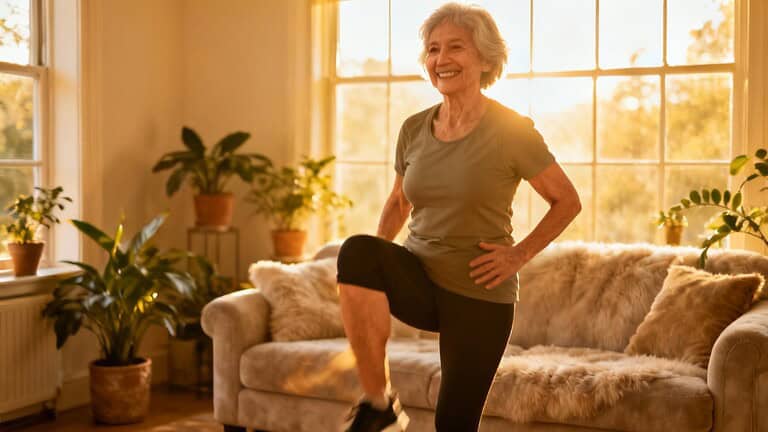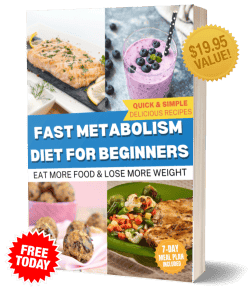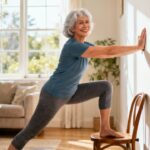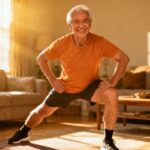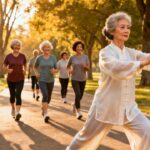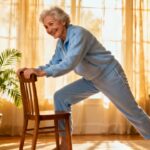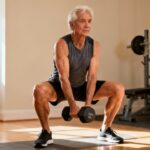Struggling to lose fat after 50? You’re not alone. As metabolism slows and joints become more sensitive, finding the right exercises can feel overwhelming.
But what if you could burn fat, protect your joints, and boost your energy with simple, low-impact moves?
In this article, we’ll explore three effective cardio exercises designed specifically for seniors that you can do at home.
1. Standing Knee Raises: Simple Yet Powerful
If you’ve been feeling sluggish or bloated, standing knee raises might be the perfect start. This deceptively simple movement targets your lower belly, hip flexors, and glutes while improving balance.
How to Perform Standing Knee Raises
- Stand tall with feet hip-width apart.
- Tighten your core gently.
- Raise your right knee as high as comfortable without leaning back, then lower slowly.
- Switch to the left knee.
- Add arm swings or elbow-to-knee taps for stability.
- Aim for 30–60 seconds per round, 3–4 rounds with rest.
For more intensity, hold light weights like dumbbells or water bottles.
Why It Works
This exercise elevates heart rate and strengthens stabilizing muscles without stressing joints. It builds core strength from a standing position, avoiding floor work that might cause strain.
Precautions
Consult your doctor if you have recent hip or back surgery, balance issues, or knee pain. Consider seated marching as an alternative.
Nutrition Tip
Pair with a protein-rich breakfast within 90 minutes of waking: two boiled eggs or a plant-based smoothie, whole grain toast, and berries. Avoid sugary cereals to prevent insulin spikes.
2. Cycling: Rediscover Strength and Freedom
Cycling, whether indoors or outdoors, offers a joint-friendly way to burn fat and reconnect with movement. It activates large muscle groups like glutes and quads for efficient calorie burning.
How to Start Cycling
- For stationary bikes: Sit upright, pedal slowly for 3–5 minutes to warm up.
- Increase resistance slightly and aim for 10–15 minutes at a steady pace.
- Cool down with 2 minutes of gentle pedaling.
- For outdoor biking: Choose flat, quiet routes, wear a helmet, and stay hydrated.
Focus on consistency, not speed. Begin with 15–20 minutes and build up gradually.
Why It Works
Cycling engages your cardiovascular system and triggers fat metabolism without joint pounding. It also boosts emotional well-being by fostering a sense of freedom.
Precautions
Use caution if you have severe osteoporosis or balance disorders—opt for a recumbent bike. Adjust seat position if you experience numbness, and consult a doctor after joint surgery.
Nutrition Tip
Before cycling, have a small snack with complex carbs and protein, like a banana with almond butter. Afterward, refuel with grilled chicken or a smoothie within 45 minutes. Stay hydrated with water.
3. The Elliptical: Your Low-Impact Powerhouse
The elliptical trainer provides a smooth, gliding motion that burns fat and protects joints. It’s ideal for those who want a full-body workout without impact.
How to Use the Elliptical
- Stand tall with feet flat, grip handles lightly, and keep chest lifted.
- Warm up for 3–5 minutes at a slow pace.
- Work out for 20 minutes, increasing resistance to breathe harder but still talk.
- Cool down for 3–5 minutes, lowering resistance.
Try reverse pedaling to activate different muscles.
Why It Works
The elliptical mimics running without impact, engaging legs, core, and arms. It helps regulate hormones like cortisol and improves insulin sensitivity for better fat loss.
Precautions
Use handlebars if you have balance issues or vertigo. Those with foot neuropathy may need extra support. Consult a doctor after spinal surgery.
Nutrition Tip
Before your workout, have a half apple with peanut butter or a small protein shake. Afterward, refuel with grilled salmon or chickpeas with spinach. Avoid processed low-fat snacks.
These three exercises—standing knee raises, cycling, and the elliptical—offer a safe path to fat loss and renewed energy after 50. Pair them with smart nutrition choices like adding protein and staying hydrated.
Remember, consistency matters more than perfection. Start gently, believe in your body, and watch how small steps lead to big changes. What move will you try first?

